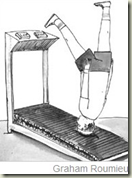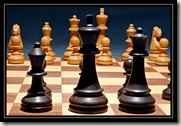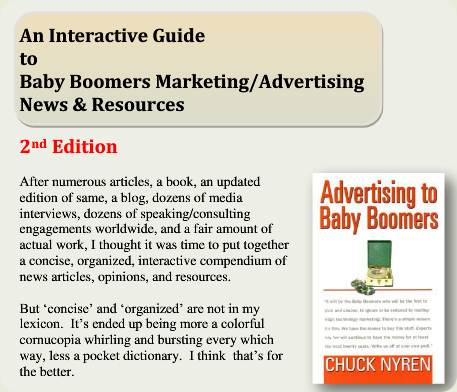As NostraChuckus predicted, it’s the Year of The Baby Boomer Brain.
More research about brain games:
Brain-training companies are challenging the findings:
 Posit Science Disputes Results
Posit Science Disputes Results
"There is a fatal flaw in the BBC study; it assumes that since their methods did not work, all methods would not work," said Steven Aldrich, CEO Posit Science.
Obviously I’m not qualified to comment on whether these digital gizmos revivify your rotting noggin. However, for years I’ve questioned why the hype was so thick. Did it have to be?
 Study: Brain Exercises Don't Improve Cognition By Eben Harrel
Study: Brain Exercises Don't Improve Cognition By Eben Harrel
The study … undermines the sometimes outlandish claims of brain-boosting websites and digital games.
My advice has always been to take the high road with the 50+ Market. They’ve been around long enough to recognize most B.S. – and when they feel they’ve been fooled, say goodbye to them.
A post from a year ago:
The Brain Games Game
I scratched my not-too-bright head and wondered what the difference was between a brain game and any mind-bending game: Rubik's Cube, Scrabble, Sudoku, etc. Obviously, this new crop of revolutionary IQ busters improved your brain power while all the others were, I guess, just for laughs.
 And that’s what bothered me about the marketing – and still does. Are these new-fangled blinking lights on a screen the best way, the only way to keep your noggin nimble? This seems to be the claim. Or are they a new breed in a long line of cognitive games that go back to counting pebbles on cave floors?
And that’s what bothered me about the marketing – and still does. Are these new-fangled blinking lights on a screen the best way, the only way to keep your noggin nimble? This seems to be the claim. Or are they a new breed in a long line of cognitive games that go back to counting pebbles on cave floors?
You certainly get the ‘hard-sell’ impression that if you don’t buy and play these games, eventually your brain will leak out of your nose and ears. Why not just tell the truth? These are high-tech, stimulating computer-generated exercises that will help keep your mind sharp - are structured, measurable to some degree (so they’re useful for medical research), and quite entertaining.
And there are a lot of them – so you won’t get bored just playing one over and over.
Not much has changed since that post. The brain game industry recklessly jumped into hype mode and now they’re paying the price. It doesn’t matter what the truth is – the doubts are out there for all to see.
 With a bit of sensible PR, marketing, and advertising – the industry could have avoided all the negative publicity by positioning their products not as miracles, but as what they are – brain-twisting workouts that are fun to play, keep your mind active – and in research/medical settings are measurable instruments. They don’t make you smarter, they aid in making you as smart as you are.
With a bit of sensible PR, marketing, and advertising – the industry could have avoided all the negative publicity by positioning their products not as miracles, but as what they are – brain-twisting workouts that are fun to play, keep your mind active – and in research/medical settings are measurable instruments. They don’t make you smarter, they aid in making you as smart as you are.
Oh, well. Perhaps the brain games powers-that-be didn’t play enough brain games …
_____
Dick Stroud: Dumbed down Science
Laurie Orlov: The BBC Brain Training study -- let's flip it around
Hi Chuck ,
 Nice to see a Boomer timeline that doesn’t stop with the Vietnam War – as if we all disappeared in the early 1970s – and magically reappeared thirty-five years later in a Volkswagen Bus.
Nice to see a Boomer timeline that doesn’t stop with the Vietnam War – as if we all disappeared in the early 1970s – and magically reappeared thirty-five years later in a Volkswagen Bus.








